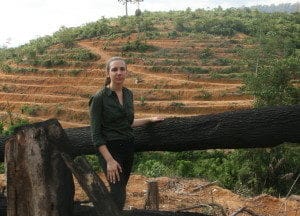On the Ground in Jakarta: Working Towards Sustainable Palm Oil
Left: Kate Kroll, Shareholder Advocate with Green Century
Part of our shareholder advocacy program at Green Century is heavily focused on working to improve policy at home and abroad; which is why I’m here, halfway across the world, working to address the environmental and societal issues created by the vast supply chains of the companies we invest in through policy.
The majority of palm oil, the most widely used vegetable oil in the world, comes from Southeast Asia — specifically Indonesia and Malaysia. The two countries account for 85 percent of world production. Traditional cultivation of palm oil is a major cause of deforestation, with devastating consequences for local communities, habitat critical for endangered species, and climate change.
Sustainable palm oil can improve the standard of living for many of the people living and working here. Environmental and social issues are becoming more important to the average consumer, particularly in western countries, and my colleagues and I believe that market forces will not only sustain the economy for sustainably sourced palm oil, but also enhance it.
And while we’ve seen incredible progress towards sustainable palm oil through shareholder engagement, we believe that local and national governments have an important role to play as well.
Last year, in addition to working to fight the haze crisis brought on by fires set to clean land for the production of palm oil and pulpwood, Green Century helped organize 60 investors with more than $2 trillion in assets under management (AUM) to issue a letter to President Joko “Jokowi” Widodo supporting his forest moratorium. According to President’s declaration, which was recently formalized in April 2016, the moratorium will remain in effect for five years and cover a vast amount of Indonesia’s forest zone.
In addition to the moratorium, our letter to President Widodo helped establish the Badan Restorasi Gambut (BRG), or the Republic of Indonesia Peatland Restoration Agency, which as been charged with restoring the 5 million accres destroyed by the cultivation and production of palm oil. The creation of the agency alone sends a strong message to the rest of the Indonesia government that the president’s commitment to decoupling the Indonesian economy from the risks of deforestation is not to be taken lightly.
My peers and I from the United Nations Principles for Responsible Investment (UN PRI) Advisory Board on palm oil had the opportunity to meet with the BRG here in Jakarta. The group sees that restoring peat, which is one of the most efficient carbon sinks on the planet and could have dramatic consequences for mitigating climate change, is the best step forward to sustain the local economy and meet the ever increasing international demand for sustainable palm oil.
These are merely a few examples of how our policy work, in conjunction with the Indonesian President’s initiatives, have made a tangible impact in creating a more sustainable environment and economy. Today, we’re here to ensure that the government’s strategy for achieving sustainable palm oil is not only feasible, but also met by the many large and small palm oil producers in the region.
We know that there is a great deal more to do, however, and we look forward to working with our shareholders, companies, and policy makes on what lies ahead.
Kate Kroll, Green Century’s shareholder advocate working on forest protection, is in Southeast Asia this month reporting on the results of Green Century’s forest protection work in transforming the palm oil supply chain. Sign up here to get updates sent right to your inbox.
Stocks will fluctuate in response to factors that may affect a single company, industry, sector, or the market as a whole and may perform worse than the market. Bonds are subject to a variety of risks including interest rate, credit, and inflation risk. The Funds’ environmental criteria limit the investments available to the Funds compared to mutual funds that do not use environmental criteria.
This information has been prepared from sources believed to be reliable. The views expressed are as of the date of this writing and are those of the Advisor to the Funds.
You should carefully consider the Funds’ investment objectives, risks, charges and expenses before investing. To obtain a Prospectus that contains this and other information about the Funds, please click here for more information, email info@greencentury.com or call 1-800-93-GREEN. Please read the Prospectus carefully before investing.
The Green Century Funds are distributed by UMB Distribution Services, LLC, 235 W. Galena Street, Milwaukee, WI 53212. 9/16


